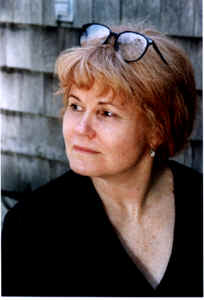Wendy Taylor Carlisle

Wendy Taylor Carlisle lives in East Texas. Her poems have appeared in Monserrat Review, Cider Press Review, Borderlands, Passager, Prairie Dog, Maverick and on-line at 2 River View, Unlikely Stories, Perihelion, The
Astrophysicist’s Tango Partner, Isibongo, Conspire, Tintern Abbey, Zuzu's Petals, Three Candles, and Pig Iron Malt. She has won The Lipscomb Award from Centenary College, a Passager Poetry Contest Award,
and has been three times nominated for a Pushcart Prize. Her first book, Reading Berryman to the Dog, was published by Jacaranda Press in 2000, and her work appears in Athens Avenue: A Collection of Poetry (Funky Dog Publishing, 1999).
Letters From Mexico
I.
Letter to David from San Miguel
Explaining Why I Can’t Come Home
The hand of this cuidad burns with fever,
an alphabet simmers the heart of the river,
daybreak has a moon in it, smells of tortilla,
barks like a car horn, roof dog, rooster,
walls trace a fractal universe of stone,
silent cattle egrets, turn their feet up to the sun,
Diego Rivera breathes on my neck.
II.
Letter to Jean from Guanajuato
In which Religion is Considered
St Joseph of the Dirt Sellers, patron
of bicyclists, gathers his ten-speed children
under a ribbed nave. Outside, crosses grow
everywhere. On the cathedral dome,
Mary bends her head to the babe, her neck
perpetually twisted to the oblique
so only mescal with the worm
can soothe its cold spasm.
III.
In a Letter to David from South of the Border,
I Plan My Escape
After the defeat of the turbines
that shoulder rooftop crucifixions,
bugambilia disappear into improbable light,
hammers surrender their usefulness and I
am de rodillas in a town of saints and broken brick.
from there it’s a jailbreak gallop to the Rio Bravo,
to the American bar where I start to grin, sip tequila
and grenadine where I drop my pen and get away clean.
A version of this poem was published in Cider Press Review
Dog Days
Along this county FM road there’s water vapor
gathered in the ditches and overhead
the oaks show dusty green.
The radio reports on politics and fornication,
a teacher and her thirteen-year-old lover.
Good folks are stunned by gossip and hot weather.
Lord, save us from the need to chide sad flesh
or to believe we’re not all animals with wishes.
Help us admit the blessing in an August wind,
a cloud-troweled sky, the shelf of rain behind.
Show us the truth’s an urgent belly,
what we need most, the slick fender on a Chevy,
a body bent over it, hot as a summer
garage, the roller coaster second before we come.
Published in Reading Berryman to the Dog, 2000, Jacaranda Press
The Relationship of Matter and Light
When Rilke begins his lessons in close observation,
he has to find what technique alone
can not uncover, that core
which is more than wave and particle or
the penchant of matter to bend the light.
He must examine connections, the ties
of seer to seen, must feel his own disunion.
Then he is ready to believe, ready for Rodin.
At first, he finds the artist’s figures rough
stares hard, resists their need for touch
until from gaze to fingertip he understands,
joins moving light to transubstantiate.
Man/panther/man he tracks his prey
into the center of his own eye.
Published in ZuZu’s Petals
Making the Bed with Ariadne
i.
Naturally, being a princess, she objects
to cotton sheets—their crisp whiteness suggests
the way in to, not out of, the maze of sleep—but once
she begins unraveling the mystery—tuck, reverse,
tuck again—she shapes each hospital corner
square as a bull’s stall, grasps the labyrinth
of eyelet and ruffles, that perplexing bedcover,
and shakes it out to show its dark center.
Ariadne’s a match for any household duty.
Not even Regis bellowing from the TV
can keep order from unrolling under her fingers
as she works on. Slipping through the corridors,
tangled hours spooling out, she threads her way
from room to room, from dim disorder into broad day.
ii.
According to Minos, her bullish father,
"she made her bed" and if the woeful
sheets chafed later when she woke
"too bad." Ariadne had been, he said, "too clever
by half" with that waiting boat, that ball of twine.
And after, if fatigue took her like a storm of bees,
shut her eyes with hymenopterous lullabies,
"You snooze, you lose," he roared, "Don’t
whine."
Dad who butchered youths and virgins
fourteen at a whack, was stymied by rebellion
in his hausfrau daughter, snorted his disdain.
"I warned her off good looking men" and
sure enough that looker, Theseus, had a plan;
he watched her doze on Naxos and was gone.
A version of this poem was published in Riding the Meridian
